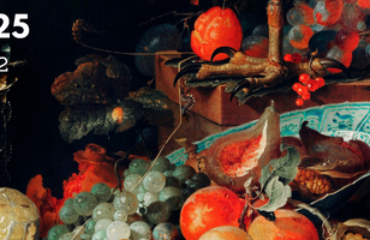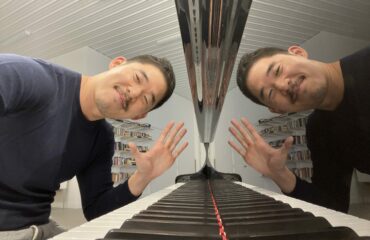KHOSHBAKHTAM by Kent Kosack

Fifi leased her mother a Kia Rio and her mother hates her for it. She tries to deflect and asks her mother about her coworker, Mindy. Poor Mindy.
“Mindy? Didn’t I tell you about Mindy? About my glasses? My Miklis?” her mother says.
Fifi shakes her head, looks at the bare walls of her mother’s central New Jersey apartment and feels like she has to learn everything there is to know about Mindy. “I don’t think so. I’d remember.”
“Mindy is practically blind. Looks like a bag lady. Which is fine because she sells handbags, but I wouldn’t buy one from her. No sense of style. Sort of like you with that hideous car you got me,” she says, taking a sip of the Turkish coffee she’s just made. She sips the foam off the familiar caffeinated sludge out of the familiar cup, a demitasse, the last of a long-lost set, its sisters stolen a decade ago when Fifi’s mother’s storage unit was broken into and most of her possessions — “my life, Fifi, my whole life”— were stolen. Its white ceramic is decorated with swirling, pastel flower petals. To Fifi the petals look like smudged fingerprints, a child’s drawing.
“Did Mindy steal your Miklis?”
Another sip. Fifi’s mother eyes her over the cup with a look that seems to ask are you really mine?
“Are you even listening? Mindy wouldn’t know a pair of Miklis from gas station readers. Mindy, useless, that one. She follows me around the store all day, eavesdropping, trying to copy my style, the way I sell. I’m not paid to teach Mindy how to do her job. They would have to pay me triple just to get her to understand the difference between a Rolex and a Timex.”
Fifi glances at the Timex on her own wrist. A little plastic military watch she bought a week ago hoping its martial design might make her decisive and help her process the results of the test she took that say her body is going to produce a child unless she does something to stop it. Instead of deciding, she left her husband, clueless, in New Hampshire. And came to Jersey. To her mother. Poor Fifi.
Her mother isn’t clueless. Seems to sense something. Fifi thinks of her as a medic in a warzone, expert at sniffing out rotten wounds. Except her mother has no interest in healing them.
“So how is that husband of yours?”
“He has a name.”
“Excuse me, I didn’t know we were being formal. How’s Josh?” her mother says, over-emphasizing the last two letters like she’s shushing Fifi before she has a chance to answer.
“He’s fine,” Fifi says, a bit too quickly. Though it’s not a lie. He’s fine, she thinks. They, as a couple, though, are not. Or maybe she is the problem. Her inability to be fine is cast in stark relief by his enduring fineness.
“You could have done better.”
“Mom, let’s not start this.”
“Fifi, you were a straight-A student. You went to a great school. Had every opportunity.”
“Mom, please.”
“And you decided to marry some oaf from the Midwest and move to the woods. To New Hampshire.”
“We don’t live in the woods,” Fifi says, half-heartedly defending her husband of six years, her home, her choices.
Her mother laughs. “New Hampshire? Who’s even heard of such a place?”
“But what happened to the Miklis?”
“The what?”
“The Miklis. And Mindy,” Fifi says, clinging to the fate of the glasses like a lifeline.
Her mother takes her final slurp and flips the cup upside down in its saucer to let the sludge slide down its sides and harden. She’ll read her fortune later in its muddy lines. “Well, last week, Wednesday I think, I was closing. Working the late shift. On my feet all day at seventy-two. On my feet selling clothes to these obnoxious New Jersey nobodies and all I want is a nice little SUV and my daughter, my only daughter, who’s supposed to help me, marries a contractor, moves to the woods, and makes me drive a sedan—”
“Mom.”
“And Mindy is stuck to me like a parasite in cheap shoes when in walks this group of Russian tourists. Very tacky, the Russians.”
“Mom.”
“What? I’m not prejudiced. They’re a pain in the ass. Ask anyone. Pushy people. Though they used to give your grandfather cans and cans of caviar. He never touched them. He only ate Persian caviar. But I wasn’t so picky,” her mother says, smiling, remembering the caviar and her family’s wealth that had made it a kitchen staple instead of a luxury. “I’ll bet Josh has never even had caviar. They probably don’t know what it is out in Wisconsin.”
“He’s from Minnesota, Mom. You know that.”
“Wisconsin, Minnesota, whatever. I need to lie down,” she says. “This whole Kia ordeal has taken a lot out of me. Help yourself to a lamb shank. It’s on the stove.”
“I’m not hungry.”
“Pack it up and take it to New Hampshire, then. Give it to your husband.” She laughs to herself. “Though he doesn’t like lamb, does he?”
“What about Mindy and the Miklis?”
“Mindy? Oh. They fired her.”
“What? Why?”
“She’d been shoplifting for years.”
“How did they finally catch her?”
“I told HR.”
“What? I thought she was your friend?”
“Friend? No. I can’t be friends with a thief. She’s just someone to talk to.”
“And the Miklis?”
“What about them?”
“Did Mindy steal them too?”
“Steal them? She doesn’t even know who Alain Mikli is. She’s too stupid to steal them. Why do you keep going on about the Miklis?”
“You mentioned them before.”
Her mother waves her hand lazily. “I’m going to take a nap.” She heads to her bedroom, closes the door, and turns the television on.
Her mother is watching tennis from the sound of it. Fifi doesn’t know how her mother’s aging eyes can follow the quick back-and-forth anymore, but maybe it doesn’t matter. Maybe hearing the ball bounce off the clay, the serve and return, is its own sort of entertainment. Before long, her mother’s snores grow louder than the players’ serves.
*
Fifi wakes from her nap to her mother hovering over her, eating peanut butter out of a jar by the tablespoon. Fifi fell asleep on the guest bed, an inflatable single she bought her mother last year. She didn’t spring for a double because she hoped she’d never have to visit. And bringing Josh to visit her mother would be like feeding chum to a shark.
“The Russian tourists loved me.”
“What?”
“At work. They took photos with me. They thought I was Elizabeth Taylor.”
“Isn’t she dead?”
“They didn’t know that.”
“Did you tell them you weren’t?”
“No, why would I ruin their day?” her mother asks, smacking her lips as she loads up another spoonful of peanut butter. “I pretended to be her, not an employee but a customer. I walked around and they followed me and I told them about my dear, sweet Richard Burton.”
“What did they say?”
“How would I know? I don’t speak Russian,” she says. “I was never good with languages. Your grandfather, now he was gifted. He spoke French, Farsi, Arabic, Turkish, English, some Russian too. Like you when you were in school, remember? You did so well in Spanish. By the way, how many languages does Josh speak?”
Fifi remembers her Spanish class. Memorizing all those words, the feminine, the masculine, the charts of foreign tenses. Trying hard to be like her multilingual, cosmopolitan mother, but sensing that no language would bring them any closer. “Mom.”
“What, sweetie? Want some peanut butter?”
Her mother doesn’t see her shake her head in the dark. “Why didn’t you let me learn Farsi when I was a kid?”
“Farsi? Why would you want to learn Farsi?”
“To learn about my culture, my background. To be able to talk to Grandma,” she says, not adding: to be able to talk to you.
“Don’t be stupid. It’s a useless language. No one speaks Farsi except for Persians, and you’re never going there, so what would be the point?”
“I like the sound of it.” She remembers her grandmother’s summer visits and how she insisted on telling Fifi bedtime stories. Though Fifi couldn’t understand a word of Farsi, she liked not falling asleep alone.
“French is prettier. You should have studied French. Comment allez-vous, Madame?”
Fifi sits up. The inflatable bed squeaks, loses air. “What time is it?”
“Eight o’clock.”
Fifi remembers her own watch, confirms the time. She looks out the window at the Kia in the parking lot. It’s blue-black now in the dark, the color of pavement. “I thought it was later. Midnight.”
Her mother grabs her shin and says, “Moosh moosh,” like she did when Fifi was a kid, holding Fifi’s feet together to keep them from growing. She’d press Fifi’s head, too, to try to keep her small. “You hungry? I made ghormeh sabzi for you.”
“No, I’m not. I barely touched the lamb shank. Thanks, though.”
Her mother’s tone changes, sharpens. “Well, get up. You have to eat it. I won’t.”
“Why’d you make it, then?”
“For you. I don’t know. Habit? I hate Persian food. It’s so bland. Come on, up, up,” she says, pulling the blanket off Fifi and heading to the kitchen. She turns on the light and the burner beneath the stew. Smells of turmeric, onion, lime. “I also made rice.”
Fifi’s mother scoops out the saffron-colored rice, the bottom crisp and crunchy, and heaps it into a white bowl. They sit at the tiny table in the living room, an iron bistro set more at home on a balcony overlooking the French Riviera than the marshlands of central Jersey. Her mother watches her eat the stew one green spoonful at a time.
*
After dinner, her mother returns to the television, and Fifi slinks out seeking fresh air. She walks around the complex, a sprawling fifty-five and older community with a few low-income units managed by HUD that her mother, with Fifi completing the paperwork, was lucky to get.
Of course, her mother hates the place, the people. She calls it “the swamp.” Says it smells of death. And it is next to a swamp, a patch of wetland turned into a nature preserve. Fifi stands at the edge of it, where the pavement abuts the vegetation, and calls Josh.
He answers on the second ring. “You strangle her yet?”
“I’m tying the noose as we speak. Only I’m not sure if it’s for me or her.”
“I take it she’s not grateful for the car?”
“She has a car that runs. That’s all that matters,” she says, hearing her husband breathe through the line, reading into each inhale, trying to discern their future.
“We could have gotten her one she wanted. An SUV or something. She’s your mother after all.”
“With what money?”
“We can swing it. Money isn’t everything.”
“Don’t be naïve,” she says, addressing both her husband and the swamp. In November, the swamp doesn’t feel so alive, so hot and sticky. It doesn’t feel like anything.
“Do you want me to come down there? I can catch a morning flight to Newark,” her husband asks her from their kitchen table three hundred miles away. She realizes her mother lives in central New Jersey’s version of the woods. When she doesn’t answer, he says, “Fifi? Farideh?”
She hangs up when she hears her Persian name. It means delightful in Farsi. She can’t help but think she was misnamed.
She returns to her mother’s snores and ladles the stew into plastic containers to put in the fridge. Neon yellow stains from the turmeric speckle her top. She opens her mother’s eyeglass case on top of the microwave and puts on her red Miklis. She tries to feel as stylish and elegant as her mother but the prescription is wrong, far too strong. The appliances look foreign, warped, monstrous. She takes them off. Her eyes take a while to refocus. The blurriness lingers.
*
In the morning, her mother sits on the end of the inflatable bed, pushes Fifi’s legs to the side and hands her a photo of her father shaking hands with the last Shah of Iran.
“Where’d you find this?” Fifi asks.
Most of the family photos are gone, stolen from the storage unit along with the family heirlooms—gold bangles, Persian turquoise earrings, bright blue rugs from across Iran.
“I forgot I had it in the glove compartment of the Saab. I cleaned it out. You can keep it.”
Fifi holds the photo as carefully as she imagines her father may have held her. She has no memory of him. He was shot outside the diner he owned in Ramsey when she was two. Murdered during a robbery, the police said, though her mother always claimed it was payback for things he’d done, terrible things, when he was a member of Savak, the Shah’s secret police. In the photo he looks dark and handsome, darker than Fifi by a few degrees. He looks like a stranger.
“I’m pregnant,” Fifi says.
“Your father was a lovely man,” her mother says. “A very handsome fool.” She stands, shaking her head. “I’ll toast you a bagel.”
*
Her mother forces Fifi to read her fortune in yesterday’s coffee grounds. Fifi used to love it, as a kid, sitting around with her mother’s clique of Iranian friends, pro-Shah refugees, drinking thick coffee and eating tiny cookies made from chickpea flour, crumbly and redolent of cardamom. She saw no futures in the cups but liked making up stories about the streaks, pretending they were people, exotic places, vast fortunes. Her mother said she had a gift for it.
“Mom, I’m not in the mood,” she says, taking the cup from her nonetheless.
“It’s not your fortune, what do you care?”
Fifi looks at the mud. There are shapes in it, shapes that could be figures. Her mother’s former lover about to sweep her away to Dubai or Majorca; her aunt visiting or dying or winning the lottery; the widower across the street buying her mother flowers. One thick gob could pass for a car. Another for a child. Fifi shows it to her.
“It looks like the fortune has already come to pass, mom. See? A car.”
“It doesn’t look like a car to me.”
“A new car,” Fifi insists, “That your daughter will go out of her way to get. She’ll take time off from work and drive across four states to come lease a car for you so you don’t get stranded in the middle of nowhere in your ancient Saab.”
Her mother is painting her nails a rich purple, the skin of a plum. “Well, I hope so. I really do. Because I need a new one. I won’t be caught dead in that blue piece of shit.”
“You’re impossible.”
“What does that mean? Is it too much to want a decent car? After all I did for you?”
“You’re so fucking entitled,” Fifi says, putting the cup right-side up in its saucer.
“What do you know about it? Did you have your whole country taken from you by a bunch of lunatic mullahs? Did you have to leave your friends and family behind? Your culture? Your language? Did you see your husband’s body after it was gunned down in the street? Did you?”
“And that’s my fault?”
“No. I guess it’s not,” she says, looking especially thoughtful. She closes the bottle of polish, puts on her Miklis, spends a minute examining the muddy fortunes in her cup.
“Whose then?”
“Your father’s.”
“How do you figure?”
Her mother puts the cup down and blows on her left hand, each nail glossy. “I didn’t want to come to the US. We had money at the time. My friends were settling in London. It was the sixties. People were having fun. But your father dragged me to New Jersey.”
“You didn’t get to see the Rolling Stones in concert and eat fish and chips and ride the tube to work, and that’s my fault?”
“We came here,” she says, waving her hands in the air to dry the polish.
“Is that so bad?”
“And I had you.”
Fifi looks at the mud in the cup, but there is nothing but spent grounds. “What does that mean?”
Her mother rests her hands in her lap, palms down. “I never wanted kids. He did. So I had you. And he got himself killed. Which meant all I had was you. And I’m sorry, compote, but sometimes children aren’t enough.”
Fifi starts crying. Her mother’s cell phone rings.
“It’s that idiot, Mindy,” she says to Fifi.
“Does she know you got her fired?”
“She got herself fired. She stole the tackiest jewelry, stuff I wouldn’t wear if you put a gun to my head. But yes, she knows I reported her. I told her.”
“And she still calls you? What’s wrong with her? Isn’t she furious?” Fifi takes off her watch, holds it in front of her like prayer beads, runs her thumb over its plastic face.
“There’s nothing wrong with her. I’m irresistible.” Her mother smiles, answers Mindy’s call. “Hi, sweetie! How are you? Can you hold on one second?” She covers the phone with her hand. “Compote?”
“Yeah?”
“Want my advice?”
Fifi doesn’t or doesn’t think she does but can’t help but nod her head.
“Learn from my mistakes,” she says. “Live your life.” She walks into the kitchen and says to Mindy, “Busy? Me? No. I’m not doing anything. What is there to do in this swamp?”
*
Fifi sits in the Kia Rio and stares at the wetland. She puts her mother’s Miklis on the dashboard facing her. It’s quiet here. Peaceful, senior living. Her mother is inside watching tennis again. She runs her hands along the wheel and feels the clean vinyl, takes in the fresh smell of plastic and new upholstery. She calls Josh. He picks up on the first ring.
“Fifi, honey, hi.”
“Hi.”
“When are you coming home?”
She hears her whole life in the last word. “Sobh bekhyer,” she says, the Persian for good morning. Her grandmother taught her a number of phrases when she stayed with them. The language feels soft and familiar.
“What?”
“Esme man Farideh ast,” she says. My name is Farideh.
“Honey, I don’t understand. What are you saying?”
“Khoshbakhtam. It’s Farsi,” she tells her husband.
“Oh. Ok. What does it mean?”
“Nice to meet you,” she says.
“Well, khoshbakhtam to you too.”
She leans forward, rests her head on the steering wheel, and hangs up. Her phone rings again, but she picks up the Miklis instead. In her hands they feel no different than regular glasses, though they are much more fragile. She bends and twists one arm until she frees it from the frame, snapping the tiny metal hinge. She removes the next arm, places the three separate pieces in the glove compartment, and faces the swamp again. She grips the wheel, glances at her watch, and imagines steering straight over the marsh all the way to New Hampshire. Her phone rings and rings. But she’ll wait until she’s home to tell her husband it wasn’t him she was talking to.


